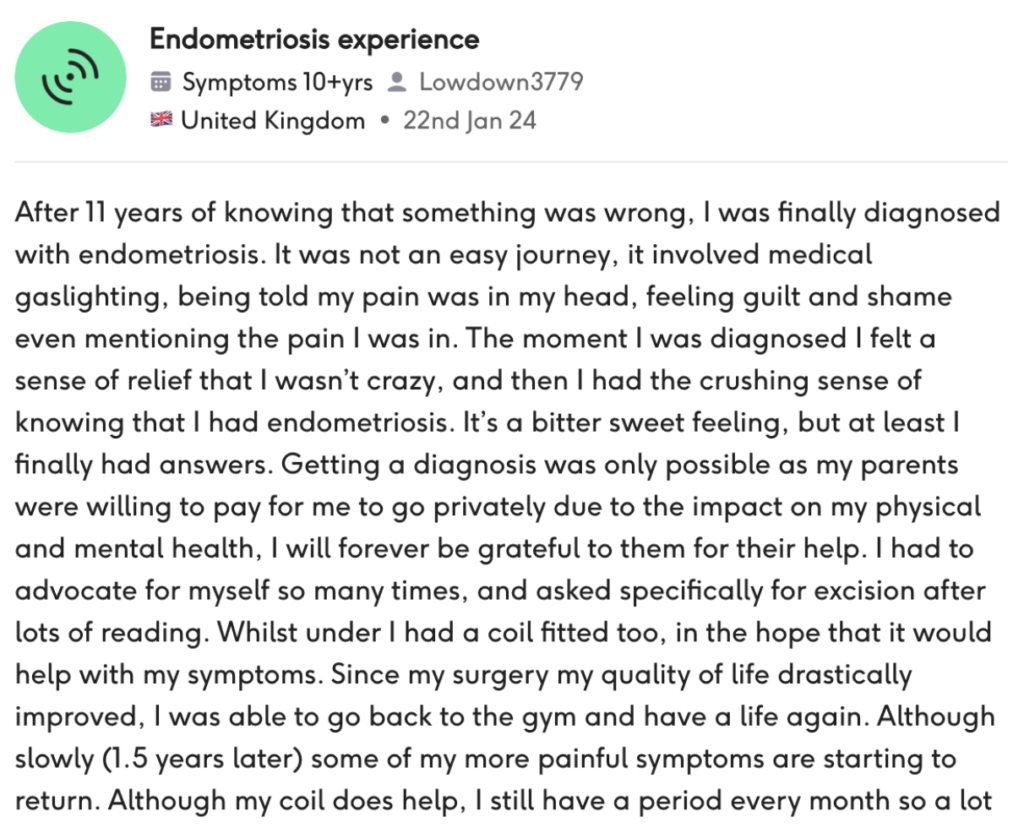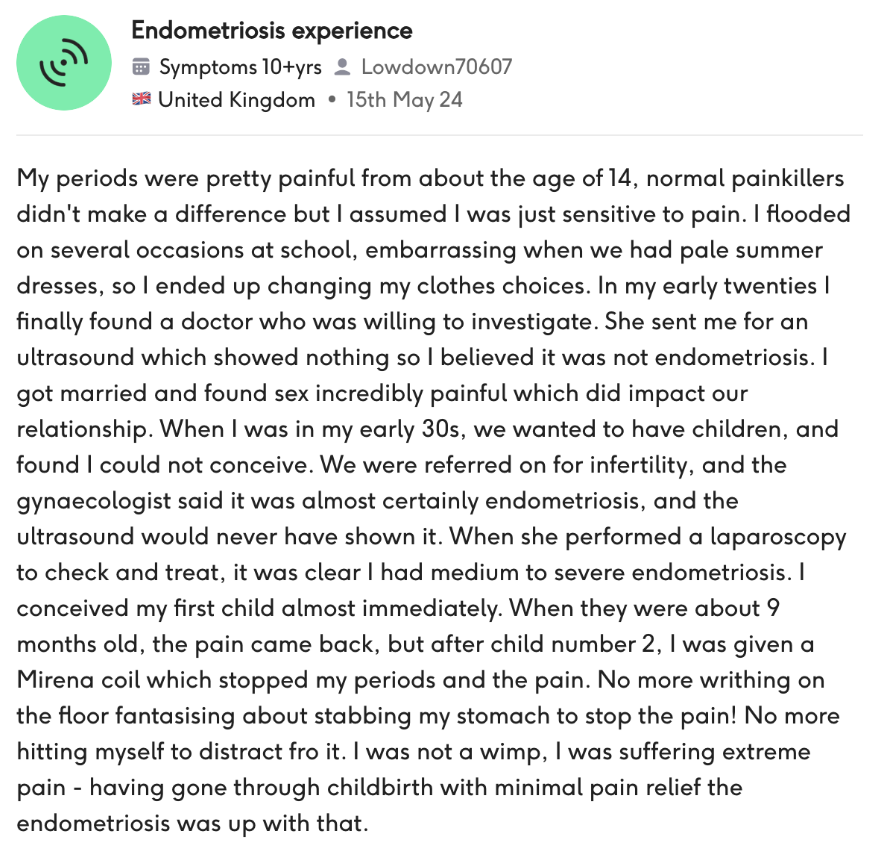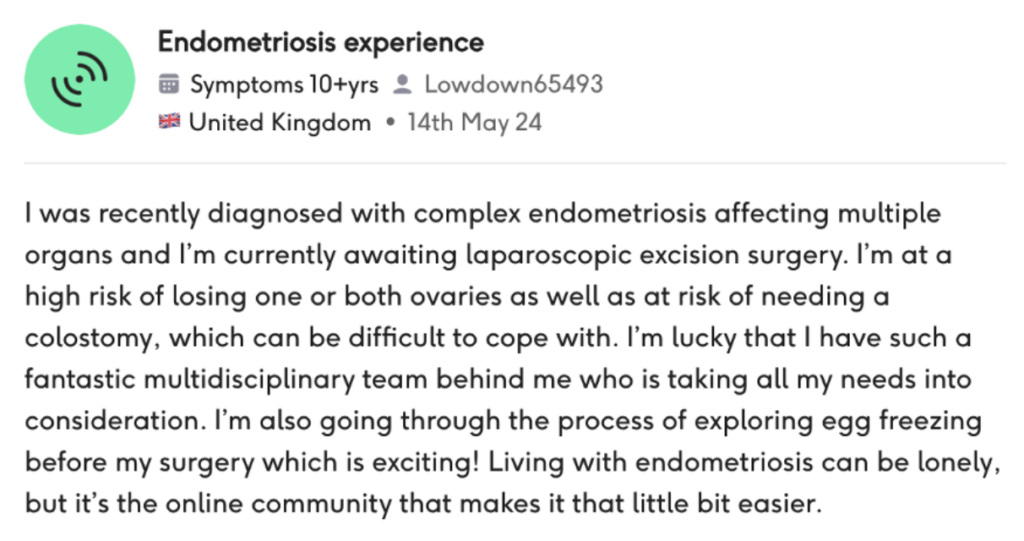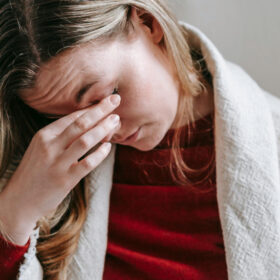
What are the stages of Endometriosis?
What's the lowdown?
Endometriosis can be classified into four stages depending on the quantity of endometrial tissue present outside the uterus
Symptoms can present with more than just debilitating period pain and do not necessarily get worse as the stages increase
Endometriosis: what, why, and how?
10% or 1.5 million women in the UK have endometriosis1. Did you know this is as common as diabetes? Yet there is still so much we don’t know about this gynaecological condition2!
Endometriosis is a chronic condition characterised by the presence of endometrial-like tissue outside the uterus (e.g. ovaries, fallopian tube, bowel) that builds and bleeds just like the uterine lining does during our periods. However, the blood has no place to escape so it stays trapped inside the body until it is broken down by the body’s immune system and inflammatory response.
You might be thinking, why and how does this happen? It is still unknown and has only been theorised. Recently, a new theory has suspected that a bacterial species called Fusobacterium found in the uterus might be a culprit for this disease3.
What are the stages of endometriosis, and how are they classified?
The American Society of Reproductive Medicine4 devised a classification system for endometriosis, which basically measures the extent of endometriosis found during a laparoscopy, dividing it into four endometriosis stages.
| Endometriosis Stages | Classification |
| Stage 1 endometriosis | 1-5 superficial endometrial tissues |
| Stage 2 endometriosis | 6-15 endometrial tissues, getting deeper |
| Stage 3 endometriosis | 16-40 endometrial tissues, majority are deep, scarring and ovarian cysts may be present |
| Stage 4 endometriosis | More than 40 endometrial tissues, majority are deep, scarring, and ovarian cysts are more severe |
Which endometriosis stage has the worst symptoms?
A higher stage of endometriosis does not necessarily mean the symptoms are more severe! There is also no specific set of symptoms tied to each stage. Each individual’s experience with the condition varies.
Endometriosis does not necessarily progress down the stages over time: it could get worse, get better, or remain entirely unchanged5. One thing we do know is fertility rates tend to decline with higher stages6 due to the presence of ovarian cysts and fallopian tube scarring.
The symptoms of endometriosis can range from:
- Worse-than-average period pain
- Painful sex
- Uncomfortable bowel/urinary movements
- Fatigue
- Bloating
- Heavy periods
- Ovulation pain
- Bleeding/spotting outside your period
- Infertility
Are you unsure if your experience is related to endometriosis? The Lowdown has a mighty endometriosis community that have shared their stories about their symptoms, getting a diagnosis, and so much more!
Why is endometriosis so tiring?
It can be tempting to use the words tired and fatigue interchangeably. However, the difference exists. It is normal to feel tired after a hard day’s work, but if this feeling lingers all the time, this is regarded as fatigue7.
As your body is constantly trying to fight the endometriosis, it results in the feeling of fatigue. Earlier, we touched upon how the immune system and inflammatory reactions are triggered. This drains the body’s energy levels without getting a chance to recharge.
Do I have endometriosis?
The gold standard investigation is currently an exploratory laparoscopy surgery, using a camera to look into your tummy to see if any endometrial-like spots can be found outside the uterus. It is unfortunately invasive and comes with possible complications of anaesthesia and surgery. Sometimes, endometrial spots can be found on an ultrasound scan or pelvic MRI scan but these are not always sensitive.
If you don’t feel comfortable sharing your story with a doctor as you are concerned you will be dismissed, many in our community can resonate with that. Unfortunately, there have been many cases of medical gaslighting leading to long drawn-out diagnosis timelines. Many sufferers do not have their symptoms acknowledged and pain can be belittled as ‘normal’ menstrual cramping. This might be the reason the journey to receive a diagnosis can take 8-10 years on average in the UK8.

The Lowdown is here to offer a safe and supportive environment every step of the way! Reach out and ask for advice, that is what we’re here for. Speak to a Lowdown women’s health GP today.
Endometriosis treatments
Mainstay treatments include9:
- Pain medication – reduces inflammation
- Contraception – regulates or stops menstruation
- Surgery – removes endometrial tissue and scarring
It is easy to get lost in the world of contraception options. Fear not, if you need a helping hand, use our contraceptive recommender to find an option that suits your body best.

Surgery is usually recommended for stage three or four sufferers, but it does not always minimise the pain and the spots can sometimes regrow. It is also a treatment option to improve the chance of conception, as it can remove ovarian cysts or scar tissue in the fallopian tubes, normally beneficial for stage three or four endometriosis10.
However, there are many alternative therapies now readily available. Lifestyle changes have also been shown to have a benefit in managing endometriosis. Exercise and anti-inflammatory diets have been linked to a reduction in pelvic pain and also fatigue11.
As we know, endometriosis is a complex condition with symptoms and severities that affect everyone uniquely. Consider opting for a tailored treatment approach to tackle your symptoms and stage of endometriosis. It’s not one size fits all!
What happens now?
Just because your experience is unique, that does not mean you are battling this condition alone. The Lowdown was built on the background of our amazing founder who felt isolated in her search for answers about her diagnosis. We have a huge community of endometriosis warriors who constantly band together to support each other’s struggles through their own shared experiences. You might find a tip or two that can transform your life!

If you’re feeling brave, why not open up about your own experiences? It might just be the motivation someone else needs!
And while you’re at it, sign up to our newsletter to stay updated on all things women’s health!
Our medical review process
This article has been medically reviewed for factual and up to date information by a Lowdown doctor.






